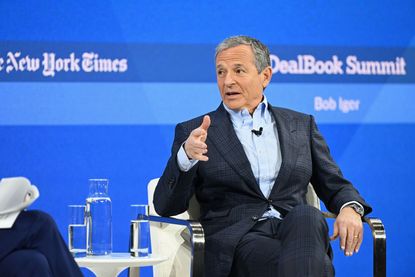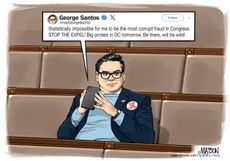The daily business briefing: November 30, 2023
The UAW pushes to unionize non-union automakers, Disney's Bob Iger says he's 'definitely' leaving in 2026, and more


1. UAW tries to unionize workers at non-union car makers
The United Auto Workers union, fresh off the success of strikes against Ford, General Motors and Stellantis, announced Wednesday that it was campaigning to unionize thousands of employees at 13 non-union automakers — including Tesla, Toyota, BMW and Nissan. "To all the autoworkers out there working without the benefits of a union: Now it's your turn," UAW President Shawn Fain said. The union won raises of up to 33% in its strikes against Detroit's Big Three. After UAW members returned to work, Toyota and other non-union automakers increased pay by about 10%. Tesla repair technicians in Sweden went on strike this month after CEO Elon Musk refused to bargain with their union. ABC News, Vice
2. Disney's Iger 'definitely' stepping down in 2026
Walt Disney Co. CEO Bob Iger said Wednesday he was "definitely going to step down" in 2026 when his contract expires, adding that the entertainment giant's board was conducting a "robust" search for his successor. Iger, 72, retired as Disney's chief executive in 2021 but returned less than a year later. Since coming back in November 2022, Iger has streamlined the company, putting it on track to save more than the $5 billion he promised investors in February. Iger also said Wednesday the company wasn't putting ABC up for sale, despite floating the idea earlier this year, arguing at the time that a migration of viewers to streaming platforms will make the broadcast network less of a "core" business down the road. Reuters
3. Report: Cigna, Humana in merger talks
Cigna and Humana are in talks to merge into what would be a health insurance powerhouse, The Wall Street Journal reported Wednesday. The proposed cash-and-stock deal could close by the end of the year if the two sides finalize it, the Journal reported, citing people familiar with the discussions. Cigna and Humana shares dropped 8% and 5.5%, respectively, on the news. If the merger goes through, the new combined company would be big enough to rival massive integrated health care leaders like UnitedHealth Group and CVS Health. Cigna has a big pharmacy benefit unit and is strong in commercial insurance. Humana would add its presence in the fast-growing Medicare business. The Wall Street Journal
Subscribe to The Week
Escape your echo chamber. Get the facts behind the news, plus analysis from multiple perspectives.

Sign up for The Week's Free Newsletters
From our morning news briefing to a weekly Good News Newsletter, get the best of The Week delivered directly to your inbox.
From our morning news briefing to a weekly Good News Newsletter, get the best of The Week delivered directly to your inbox.
4. Stock futures rise as winning month ends
U.S. stock futures gained early Thursday after the Dow Jones Industrial Average neared a 2023 high. Futures tied to the Dow were up 0.5% at 7 a.m. ET. S&P 500 and Nasdaq futures were up 0.2%. The Dow inched up less than 0.1% on Wednesday, while the other two main U.S. benchmarks edged lower. All three remained on track to finish November with big gains after a rally fueled by increasing hopes the Federal Reserve could be done raising interest rates now that inflation is cooling. "The economic data supporting the Fed to continue to keep rates at bay and possibly decrease is a huge tailwind," Jay Woods, chief global strategist at Freedom Capital Markets, told CNBC. Morningstar, CNBC
5. Google deal with Canada ends threat of blocking news content
Google reached a deal with Canada on Wednesday to pay Canadian publishers for news, backing away from a threat to block their content. The agreement settles a dispute between the internet giant and Canada over a controversial law requiring compensation for news content displayed on digital platforms, according to CNN. Under the agreement, Google will pay $73.5 million per year, indexed to inflation, into a fund to be divvied up among publishers. Instead of negotiating with each publisher, Google "will have the option to work with a single collective" of eligible news businesses, Canadian Heritage Minister Pascale St-Onge said in a statement. CNN

Continue reading for free
We hope you're enjoying The Week's refreshingly open-minded journalism.
Subscribed to The Week? Register your account with the same email as your subscription.
Sign up to our 10 Things You Need to Know Today newsletter
A free daily digest of the biggest news stories of the day - and the best features from our website
Harold Maass is a contributing editor at The Week. He has been writing for The Week since the 2001 debut of the U.S. print edition and served as editor of TheWeek.com when it launched in 2008. Harold started his career as a newspaper reporter in South Florida and Haiti. He has previously worked for a variety of news outlets, including The Miami Herald, ABC News and Fox News, and for several years wrote a daily roundup of financial news for The Week and Yahoo Finance.
-
 5 hilarious cartoons about the George Santos expulsion vote
5 hilarious cartoons about the George Santos expulsion voteCartoons Artists take on Santa versus Santos, his X account, and more
By The Week US Published
-
 Places that are already seeing a boost in tourism due to climate change
Places that are already seeing a boost in tourism due to climate changeThe Explainer Warmer temperatures are moving travelers north
By Devika Rao, The Week US Published
-
 6 snow-or-sun hotels to visit this winter
6 snow-or-sun hotels to visit this winterThe Week Recommends Make your winter dreams a reality at these properties
By Catherine Garcia, The Week US Published
-
 2023: the year of labor strikes
2023: the year of labor strikesThe Explainer Workers from Hollywood to the auto lines walked off the job this year
By Justin Klawans, The Week US Published
-
 The daily business briefing: December 1, 2023
The daily business briefing: December 1, 2023Business Briefing Tesla starts Cybertruck deliveries, the Dow surges to end November at a 2023 high, and more
By Harold Maass, The Week US Published
-
 The daily business briefing: November 29, 2023
The daily business briefing: November 29, 2023Business Briefing Mark Cuban reportedly agrees to sell majority stake in Dallas Mavericks, Charles Munger dies at age 99, and more
By Harold Maass, The Week US Published
-
 The daily business briefing: November 28, 2023
The daily business briefing: November 28, 2023Business Briefing Holiday shopping starts with strong online sales, X loses more advertisers, and more
By Harold Maass, The Week US Published
-
 The daily business briefing: November 27, 2023
The daily business briefing: November 27, 2023Business Briefing Holiday shopping starts with strong online sales, X loses more advertisers, and more
By Harold Maass, The Week US Published
-
 Consumers shatter record for Black Friday online shopping
Consumers shatter record for Black Friday online shoppingSpeed Read Americans spent an estimated $9.8 billion online during Black Friday sales, according to reports
By Justin Klawans, The Week US Published
-
 The daily business briefing: November 22, 2023
The daily business briefing: November 22, 2023Business Briefing Sam Altman returns to OpenAI after revolt, Binance founder Changpeng Zhao pleads guilty, and more
By Harold Maass, The Week US Published
-
 The daily business briefing: November 21, 2023
The daily business briefing: November 21, 2023Business Briefing OpenAI workers threaten to quit after Altman's ouster, gas prices drop in time for Thanksgiving travel, and more
By Harold Maass, The Week US Published










